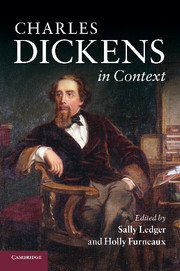Book contents
- Frontmatter
- Contents
- List of illustrations
- Notes on contributors
- Preface
- Notes on references
- PART I LIFE AND AFTERLIFE
- PART II SOCIAL AND CULTURAL CONTEXTS
- 12 Popular culture
- 13 The rise of celebrity culture
- 14 The newspaper and periodical market
- 15 Authorship and the professional writer
- 16 The theatre
- 17 Melodrama
- 18 The Bildungsroman
- 19 Visual culture
- 20 The historical novel
- 21 The illustrated novel
- 22 Christmas
- 23 Childhood
- 24 Work
- 25 Europe
- 26 The Victorians and America
- 27 Educating the Victorians
- 28 London
- 29 Politics
- 30 Political economy
- 31 The aristocracy
- 32 The middle classes
- 33 Urban migration and mobility
- 34 Financial markets and the banking system
- 35 Empires and colonies
- 36 Race
- 37 Crime
- 38 The law
- 39 Religion
- 40 Science
- 41 Transport
- 42 Illness, disease and social hygiene
- 43 Domesticity
- 44 Sexuality
- 45 Gender identities
- Further reading
- Index
- References
23 - Childhood
Published online by Cambridge University Press: 05 August 2012
- Frontmatter
- Contents
- List of illustrations
- Notes on contributors
- Preface
- Notes on references
- PART I LIFE AND AFTERLIFE
- PART II SOCIAL AND CULTURAL CONTEXTS
- 12 Popular culture
- 13 The rise of celebrity culture
- 14 The newspaper and periodical market
- 15 Authorship and the professional writer
- 16 The theatre
- 17 Melodrama
- 18 The Bildungsroman
- 19 Visual culture
- 20 The historical novel
- 21 The illustrated novel
- 22 Christmas
- 23 Childhood
- 24 Work
- 25 Europe
- 26 The Victorians and America
- 27 Educating the Victorians
- 28 London
- 29 Politics
- 30 Political economy
- 31 The aristocracy
- 32 The middle classes
- 33 Urban migration and mobility
- 34 Financial markets and the banking system
- 35 Empires and colonies
- 36 Race
- 37 Crime
- 38 The law
- 39 Religion
- 40 Science
- 41 Transport
- 42 Illness, disease and social hygiene
- 43 Domesticity
- 44 Sexuality
- 45 Gender identities
- Further reading
- Index
- References
Summary
We can see by the different child characters in his books what a wonderful knowledge he had of children, and what a wonderful and truly womanly sympathy he had with them in all their childish joys and griefs …
Mamie Dickens, My Father as I Recall Him (1897)
Dickens and childhood, much like the larger story of the Victorians and childhood, is a tale of ambivalence and contradiction. His long line of suffering and expiring young fictional figures have inspired social reform and collective political action, mass hysteria and derisive laughter. Even Dickens's eldest daughter's insistently affirmative recollections of her father hint at a disparity between the author's affect-laden fictional depictions and the man's often unyielding responses to his own children. Dickens energetically participated in some aspects of his children's young lives, organising elaborate sports days, Christmas dances and theatrical performances, but he was anxious that his boys' energies were unequal to his own, famously sending several of his sons to remote outposts of the Empire in the hope that separation and responsibility would form them into independent men.
Tellingly, Mamie invokes a literary exchange as evidence of her father's engagement with actual children, recounting his response in 1838 to a letter from the 6-year-old Master William Hasting Hughes. William, the younger brother of Thomas Hughes (who went on to write perhaps the century's most famous school story, Tom Brown's Schooldays (1857), and was, in part, inspired in this fledgling genre by Dickens's delineation of boarding-school life in David Copperfield, as well as his own experiences at Rugby School), expresses his disappointment with the ending of Nicholas Nickleby, which, in his view, does not sufficiently punish the Squeers family or adequately compensate the child sufferers.
- Type
- Chapter
- Information
- Charles Dickens in Context , pp. 186 - 193Publisher: Cambridge University PressPrint publication year: 2011
References
- 5
- Cited by



